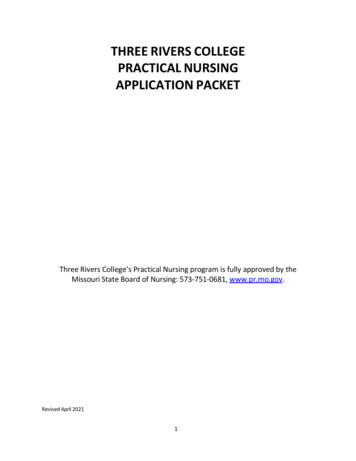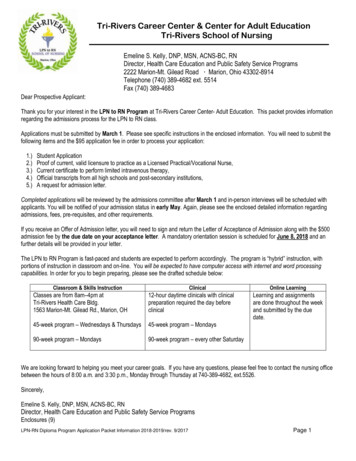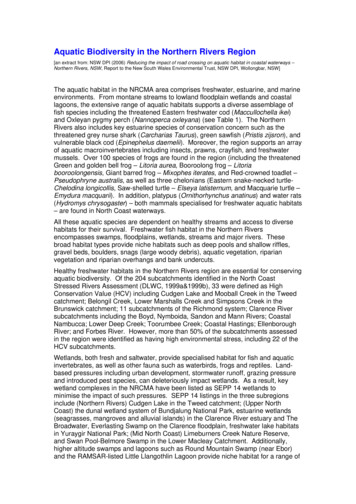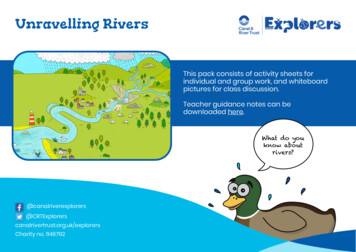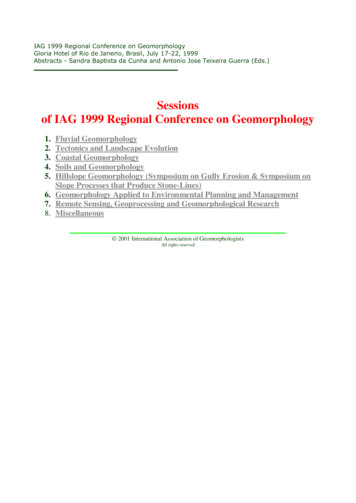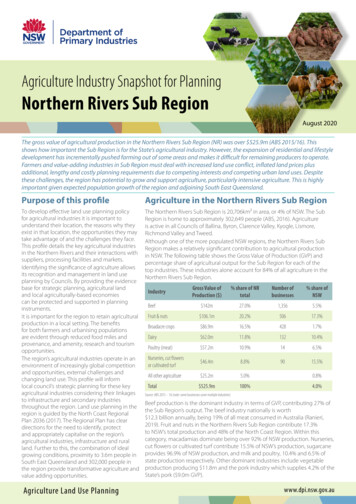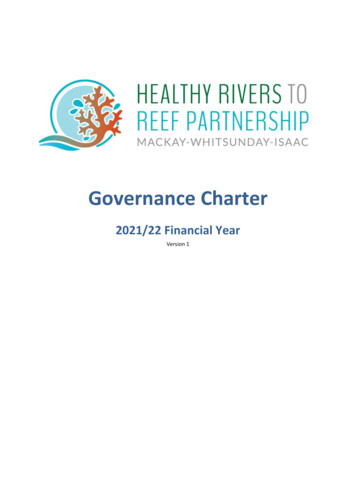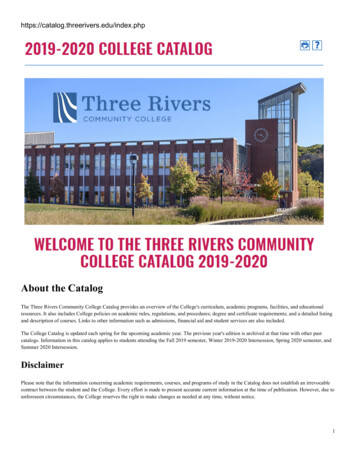
Transcription
https://catalog.threerivers.edu/index.phpAbout the CatalogThe Three Rivers Community College Catalog provides an overview of the College's curriculum, academic programs, facilities, and educationalresources. It also includes College policies on academic rules, regulations, and procedures; degree and certificate requirements; and a detailed listingand description of courses. Links to other information such as admissions, financial aid and student services are also included.The College Catalog is updated each spring for the upcoming academic year. The previous year's edition is archived at that time with other pastcatalogs. Information in this catalog applies to students attending the Fall 2019 semester, Winter 2019-2020 Intersession, Spring 2020 semester, andSummer 2020 Intersession.DisclaimerPlease note that the information concerning academic requirements, courses, and programs of study in the Catalog does not establish an irrevocablecontract between the student and the College. Every effort is made to present accurate current information at the time of publication. However, due tounforeseen circumstances, the College reserves the right to make changes as needed at any time, without notice.1
How to Use the CatalogNavigating the CatalogTo navigate through the Catalog, please use the links in the left-hand navigation menu, or use the Catalog Search box at the top of the left-handnavigation menu.Advanced SearchAn advanced search function is located under the Catalog Search box at the top of the left-hand navigation menu. It allows for searches of specificwords or phrases.Plan of Study Document (Degree Planner)You will see the Plan of Study (Degree Planner) icon at the upper right corner of each program page. Select this icon for that program's Plan of StudyForm which can be printed.My FavoritesMy Favorites is your personal catalog. It allows you to save and track your favorite degree programs, courses and other areas of the catalog thatinterest you. Click the My Favorite link, located at the bottom of the left-hand navigation menu, to create your personal catalog.1.2.To save a section of the catalog, click on the Star icon in the upper right-hand corner of the page.To access your saved sections, click on the My Favorites link at the bottom of the left-hand navigation menu.ShareShare a page from the catalog on Facebook or Twitter by clicking the Share icon in the upper right-hand corner of the page.Print-Friendly PageIf you want to print a section of the catalog, click the Print icon in the upper right-hand corner of the page. It will open a print-friendly version of thepage.HelpHaving difficulty using the catalog? Click the Help icon, located in the upper right-hand corner of the page, to access Acalog ACMS Online Help.Archived CatalogsFor prior year catalogs, please see the drop-down menu in the upper right for a list of archived catalogs.2
General Contact InfoThree Rivers Community College Campus574 New London TurnpikeNorwich, CT 06360-6598(860) 215-9016welcomecenter@threerivers.eduOff-Campus Instructional LocationNaval Submarine BaseBuilding 83Groton, CT 06349860-445-5575Three Rivers WebsitesMain site: www.threerivers.eduExtrranet (for students, faculty and staff): www.trcc.commnet.eduOnline Access to Banner, Blackboard and email: http://my.commnet.eduSocial MediaFacebook - www.facebook.com/ThreeRiversCCTwitter - twitter.com/3RiversCCInstagram - ed In - lege-cp/YouTube - rectoryFaculty and Staff Directory - http://www.threerivers.edu/directory/Office Directory (includes Fax numbers) - ic Departments - ficates/academic-department/3
President's MessageThe future belongs to those who prepare for it.- Ralph Waldo EmersonWelcome to Three Rivers Community College where you will find an education that challenges you in the best way, helps you grow as a person,advances your professional career, and hones your knowledge and skills.Here you'll find a community of like-minded students on a pathway to rewarding careers or further higher education.Here you'll find a community of faculty and staff with one goal in mind - to support and help you set and reach your goals.Here you'll become part of this great community of learning, support, challenge and friendship that will lead to a meaningful life for you and yourfamily.This catalog features the breadth and depth of our offerings. It is your primary source of information as you pursue your academic career at ThreeRivers Community College. Enjoy exploring our many offerings in over 75 associate degree and certificate programs. See just how far youraspirations will take you.I look forward to seeing you on campus.Mary Ellen JukoskiPresidentABOUT THE PRESIDENTMary Ellen Jukoski, Ed. D. has been selected as the next President of Three Rivers Community College. A graduate of College of St. Rose, Albany,NY (B.A., cum laude; M.A.), Dr. Jukoski also earned an M.S. at State University of New York. She received her Doctorate in Education from TheUniversity of Memphis in Memphis, TN.Dr. Jukoski began her academic career as Assistant Dean at Empire State College, Saratoga Springs, NY. Next, she became Assistant ExecutiveDean, World University-Miami in Florida. Following her tenure there, she held three positions at the University of Memphis, ending as AssociateDirector of the National Institute of Mental Health Federal Grant Project. Her next position was with Loretto Heights College in Denver, CO asDirector of the University Without Walls Program. Next, she held successive positions as Dean of Continuing Education and Assistant VicePresident for Academic Institution at Sacred Heart University in Fairfield, CT. She left Sacred Heart to become Academic Vice President and Deanof the College at Mitchell College, and became its Acting President and Academic Vice President. She capped her career at Mitchell by becoming itsPresident. Along the way, she has also held numerous higher education teaching positions at those schools.Throughout her career, Dr. Jukoski has received an impressive list of honors and awards, and has been appointed to numerous board positions. Shehas been published extensively, including "Understanding the Adult Learner: How Universities Get Rid of the Peter Pan Syndrome in theClassroom," published in Proceedings of National Conference on the Adult Learner; and "Learning Styles: The Practical Implications of CurrentTheory," published in Proceedings the University of Chicago and National University Continuing Education Association Conference, Developingand Teaching Programs for Adults in the Humanities, Arts and Sciences, an Exchange Between Theory and Practice; among many others.4
Three Rivers Community College Mission StatementThree Rivers is an accessible, affordable, and culturally diverse community college that meets varied educational needs by creating an environmentthat stimulates learning.To accomplish its mission, Three Rivers Community College: offers post-secondary educational opportunities fosters an appreciation of the natural and social sciences, humanities, technology and the artsencourages life-long learningprovides a well-rounded and rewarding educational experience with an emphasis on critical thinking, effective communication, and theCollege's institutional values.helps students achieve their goalsserves as a community resource for people and institutions within its service areadelivers its services efficiently and measurablycontributes to economic development of this region and the state.Three Rivers Community College Vision StatementThree Rivers Community College will be a college of choice with a reputation for innovation, quality, and accessibility, serving a dynamic studentpopulation.CSCU Mission StatementThe Connecticut State Colleges & Universities (CSCU) contribute to the creation of knowledge and the economic growth of the state of Connecticutby providing affordable, innovative, and rigorous programs. Our learning environments transform students and facilitate an ever increasing numberof individuals to achieve their personal and career goals.Connecticut Community Colleges Mission StatementAs part of the Connecticut State Colleges & Universities (ConnSCU) system, the twelve Connecticut Community Colleges share a mission to makeexcellent higher education and lifelong learning affordable and accessible. Through unique and comprehensive degree and certificate programs, noncredit lifelong learning opportunities and job skills training programs, they advance student aspirations to earn career-oriented degrees andcertificates and to pursue their further education. The Colleges nurture student learning and success to transform students and equip them tocontribute to the economic, intellectual, civic, cultural and social well-being of their communities. In doing so, the Colleges support the state, itsbusinesses and other enterprises and its citizens with a skilled, well-trained and educated workforce.5
About Three RiversOn May 9, 1962, ground was broken for the construction of a local community college soon to be named the Norwich State Technical Institute. Thefirst students began classes in September 1963. The name was changed in 1964 to Thames Valley State Technical College, and in 1970, MoheganCommunity College was also formed in Norwich.In 1992, Thames Valley State Technical College and Mohegan Community College were combined to form Three Rivers Community College, aname that was chosen to reflect the geographical nature of the region. The first commencement as Three Rivers Community College was held in1993. The two campuses were consolidated to the current location, and in the fall of 2009, Three Rivers officially opened its doors to students with anew complex that featured state-of-the-art classrooms, and science and computer laboratories. In addition to the main campus in Norwich, there isalso an instructional center located at the Naval Submarine Base in Groton.The student population consists of approximately 4,000 students enrolled in degree and certificate programs each semester, and 2,500 students in theWorkforce and Community Education program each year. Through the integration of technical, career, and liberal arts programs within the College,Three Rivers students are able to move with greater ease from one program to another.What Makes Three Rivers Unique?Three Rivers is an excellent choice for students pursuing studies beyond high school. The College offers over 60 Associate Degree and Certificateprograms. Programs range from Manufacturing Technology, Exercise Science and Nursing to Early Childhood Education, Graphic Design andBusiness Administration. Students can also transfer credits earned at Three Rivers to state universities and private colleges in order to attain aBachelor's degree or higher in the field of their choice.The Workforce and Community Education Department (WCE) offers non-credit on-campus classes as well as hundreds of online courses. Trainingand certification in various subjects, such as Allied Health, Medical Billing, and Security, help those who are looking to begin a new career, as wellas those who want to learn more to advance in their current positions.WCE also partners with employers in promoting and implementing educational training programs. This includes developing courses for the EasternAdvanced Manu-facturing Alliance (EAMA), representing over 50 manufacturers from eastern and southeastern Connecticut. Three Rivers is also acritical partner with the Eastern Workforce Investment Board (EWIB), developing the Eastern Connecticut Manufacturing Pipeline re-employmentprogram which is funded by a 6 million US Department of Labor Workforce Innovation Grant, one of only six awarded in the country, and the onlyproject focusing on manufacturing.Three Rivers has a very active Student Programs department. There are many activities, events and over 30 clubs and organizations.Many scholarship opportunities are available, and students are encouraged to apply each semester. These scholarships provide financial support forour students beyond the traditional financial aid.The College meets the diverse needs of the community by creating an environment that stimulates learning, while at the same time providingcomprehensive, accessible, affordable and innovative educational opportunities.6
Programs of StudyAssociate DegreesAccounting Career, A.S.Degree Code: A07Associate In ScienceProgram Coordinator: Edwin Muenzner - 860-215-9456This program is designed for people who intend to seek employment following graduation as junior accountants or accounting clerks. The accountingfield is among the fastest growing occupations in Southeastern Connecticut. This career program prepares students for accounting positions inbusiness and industry, government, and public accounting firms upon completion.Accounting Career Curriculum RequirementsSemester I ACC* K115 - Financial Accounting 4 CREDIT HOURSENG* K101 - Composition 3 CREDIT HOURSIDS K105 - The First Year Experience 3 CREDIT HOURSBMG* K202 - Principles of Management 3 CREDIT HOURSBMK* K201 - Principles of Marketing 3 CREDIT HOURSTotal: 16Semester II BBG* K115 - Business Software Applications 3 CREDIT HOURSACC* K118 - Managerial Accounting 4 CREDIT HOURSMAT* K123 - Elementary Statistics 3 CREDIT HOURSBBG* K231 - Business Law I 3 CREDIT HOURSACC* K125 - Accounting Computer Applications I 3 CREDIT HOURSTotal: 16Semester III ECN* K101 - Principles of Macroeconomics 3 CREDIT HOURSCOM* K173 - Public Speaking 3 CREDIT HOURS- Fine Arts Elective 3 CREDIT HOURSACC* K241 - Federal Taxes I 3 CREDIT HOURSACC* K271 - Intermediate Accounting I 3 CREDIT HOURSTotal: 15Semester IV7
ACC* K292 - Practicum in Accounting 3 CREDIT HOURSor- Elective from one of the following prefixes: ACC*, BBG*, BES*, BFN*, BMG*, BMK*, HSP*. 3 CREDIT HOURSACC* K233 - Principles of Cost Accounting 4 CREDIT HOURSACC* K272 - Intermediate Accounting II 3 CREDIT HOURS- Natural Sciences Elective 3 CREDIT HOURSTotal: 13Note: Course has a prerequisite. Students should check course description.* Indicates common course numbering. within Connecticut Community College system.Students should consult with their academic advisor regarding the minimum number of credits to be taken at TRCC and limits on non-traditionalcredits. 25% of TRCC degree requirements must be completed with TRCC coursework. Up to 50% of degree requirements can be fulfilled withnon-traditional credit. Non-traditional credit includes CLEP/DSST exams, Credit by Exam, APL credit, and Military credit.Grand Total: 60Accounting Career, Associate in Science Degree Program OutcomesUpon successful completion of all program requirements, graduates will be able to:1.2.3.4.5.Demonstrate knowledge of general business vocabulary specific to the field of Accounting.Demonstrate knowledge of those principles and skills applicable to general business and those specific to the field of Accounting.Demonstrate the ability to apply learned principles and skills to unique factual settings using correct vocabulary.Have obtained a well-rounded general education.Successfully find a job in the Accounting field.Art Studies, A.A. - CSCU Pathway TransferCSCU's Transfer Ticket degree programs provide pathways for community college students to complete degree programs that transfer to ConnecticutState Universities (Central, Eastern, Southern, and Western) and Charter Oak State College without losing any credits or being required to take extracredits in order to complete a bachelor's degree in that same discipline. You will be able to transfer, apply to competitive admissions majors, andcomplete your BA/BS degree in the same time and with the same course requirements as students who start at a CSU or COSC.Click HERE for more information on the CSCU Pathway Transfer Degree: Art Studies, A.A. program.Biology Studies, A.A. - CSCU Pathway TransferCSCU's Transfer Ticket degree programs provide pathways for community college students to complete degree programs that transfer to ConnecticutState Universities (Central, Eastern, Southern, and Western) and Charter Oak State College without losing any credits or being required to take extracredits in order to complete a bachelor's degree in that same discipline. You will be able to transfer, apply to competitive admissions majors, andcomplete your BA/BS degree in the same time and with the same course requirements as students who start at a CSU or COSC.8
Click HERE for more information on the CSCU Pathway Transfer Degree: Biology Studies, A.A. program.Business Administration, A.S.Degree Code: KA30Associate in ScienceProgram Coordinator: James O'Shea - 860-215-9459This program is designed with options in Management, Finance & Banking, Marketing, Small Business and Entrepreneurship, Hotel Management,and Restaurant Management. Each degree is designed to prepare individuals for positions of responsibility in small businesses, corporations,government, and public and private agencies upon completion. Recent surveys show that there are increasing opportunities for managerialemployment in areas such as finance, marketing, hospitality, retailing and many other business services. Individuals already employed in business orindustry seeking career advancement would also benefit from this program as a source of professional development.For a semester sequence visual illustration please visit: http://www.trcc.commnet.edu/Div academics/Business/index.shtmlBusiness Administration Curriculum RequirementsCredit hours listed within each semester sequence include all concentrations, please note to select only courses within your option.Options Key: M-Management, F-Finance & Banking, K-Marketing, S-Small Business & Entrepreneurial StudiesSemester I ACC* K115 - Financial Accounting 4 CREDIT HOURS (M, F, K, S)ENG* K101 - Composition 3 CREDIT HOURS (M, F, K, S)IDS K105 - The First Year Experience 3 CREDIT HOURS (M, F, K, S)BMK* K201 - Principles of Marketing 3 CREDIT HOURS (M, F, K, S)BMG* K202 - Principles of Management 3 CREDIT HOURS (M, F, K, S)Total: 16Semester II BBG* K115 - Business Software Applications 3 CREDIT HOURS (M, F, K, S)MAT* K123 - Elementary Statistics 3 CREDIT HOURS (M, F, K, S)orMAT* K167 - Principles of Statistics 3 CREDIT HOURS BBG* K231 - Business Law I 3 CREDIT HOURS (M, F, K, S) - One elective from the following: BBG* K210 - Business Communication , BBG* K232 - Business Law II or BFN* K201- Principles of Finance 3 CREDIT HOURS (M) - One elective from the following: BBG* K210 - Business Communication or BMG* K210 - Organizational Behavior 3CREDIT HOURS (F) BES* K118 - Small Business Management 3 CREDIT HOURS (S)ACC* K118 - Managerial Accounting 4 CREDIT HOURS (M, F, K, S)- One elective from the following: BMK* K106 - Principles of Selling , BMK* K123 - Principles of Customer Service , BMK* K235 - Public Relations or BMK* K241 - Principles of Advertising 3 CREDIT HOURS (K)Total: 15 or 169
Semester III ECN* K101 - Principles of Macroeconomics 3 CREDIT HOURS (M, F, K, S)COM* K173 - Public Speaking 3 CREDIT HOURS (M, F, K, S)- One elective from the following: BMG* K210 - Organizational Behavior or BMG* K220 - Human Resources Management 3 CREDIT HOURS (M)and- One elective from the following: BBG* K210 - Business Communication , BBG* K232 - Business Law II or BFN*K201 - Principles of Finance 3 CREDIT HOURS (M)BFN* K201 - Principles of Finance 3 CREDIT HOURS (F)BFN* K110 - Personal Finance 3 CREDIT HOURS (F)- One elective from the following: BBG* K210 - Business Communication , BMG* K210 - Organizational Behavior orBBG* K232 - Business Law II 3 CREDIT HOURS (K)and- One elective from the following: BMK* K106 - Principles of Selling , BMK* K123 - Principles of Customer Service , BMK* K235 - Public Relations or BMK* K241 - Principles of Advertising 3 CREDIT HOURS (K)- Fine Arts Elective 3 CREDIT HOURS (M, F, S)GRA* K151 - Graphic Design I 3 CREDIT HOURS (K)- One elective from the following: BBG* K210 - Business Communication , BBG* K232 - Business Law II or BFN*K110 - Personal Finance 3 CREDIT HOURS (S)and- One elective from the following: BMG* K210 - Organizational Behavior or BMG* K220 - Human Resources Management 3 CREDIT HOURS (S)Total: 15 or 16Semester IVManagement Concentration BBG* K294- Business Internship 3 CREDIT HOURSor- One elective from the following prefixes: ACC*, BBG*, BES*, BFN*, BMG*, BMK*, HSP* 3 CREDIT HOURS- Natural Science Elective 4 CREDIT HOURSBMG* K228 - Labor and Employment Law 3 CREDIT HOURSBMG* K218 - Operations Management 3 CREDIT HOURSFinance and Banking Concentration ACC* K292 - Practicum in Accounting 3 CREDIT HOURSor- One elective from the following prefixes: ACC*, BBG*, BES*, BFN*, BMG*, BMK*, HSP* 3 CREDIT HOURS- Natural Science Elective 4 CREDIT HOURSBBG* K232 - Business Law II 3 CREDIT HOURSECN* K102 - Principles of Microeconomics 3 CREDIT HOURSMarketing Concentration BMK* K292 - Practicum in Marketing 3 CREDIT HOURSor- One elective from the following prefixes: ACC*, BBG*, BES*, BFN*, BMG*, BMK*, HSP* 3 CREDIT HOURS10
- Natural Science Elective 4 CREDIT HOURS - One elective from the following: BMK* K106 - Principles of Selling , BMK* K123 - Principles of Customer Service , BMK* K235 - Public Relations or BMK* K241 - Principles of Advertising 3 CREDIT HOURS- One elective from the following: BBG* K210 - Business Communication , BMG* K210 - Organizational Behavior orBBG* K232 - Business Law II 3 CREDIT HOURSSmall Business and Entrepreneurial Studies Concentration BES* K218 - Entrepreneurship 3 CREDIT HOURS- Natural Science Elective 4 CREDIT HOURSBES* K239 - Business Plan Development 3 CREDIT HOURS- One elective from the following: BBG* K210 - Business Communication , BBG* K232 - Business Law II or BFN*K110 - Personal Finance 3 CREDIT HOURSTotal: 13Note: Course has a prerequsite. Students should check course description* Indicates common course numbering within Connecticut Community College system.Students should consult with their academic advisor regarding the minimum number of credits to be taken at TRCC and limits on non-traditionalcredits. 25% of TRCC degree requirements must be completed with TRCC coursework. Up to 50% of degree requirements can be fulfilled withnon-traditional credit. Non-traditional credit includes CLEP/DSST exams, Credit by Exam, APL credit, and Military credit.Grand Total: 60Business Administration, Associate in Science Degree Program OutcomesUpon successful completion of all program requirements, graduates will be able to:1.2.3.4.5.Demonstrate knowledge of general business vocabulary and vocabulary specific to the business field.Demonstrate knowledge of principles and skills applicable to general business and those specific to the field.Demonstrate the ability to apply learned principles and skills to unique factual settings using correct vocabulary.Have obtained a well-rounded general education.Be prepared for employment in the business field.Business Studies, A.A. - CSCU Pathway TransferCSCU's Transfer Ticket degree programs provide pathways for community college students to complete degree programs that transfer to ConnecticutState Universities (Central, Eastern, Southern, and Western) and Charter Oak State College without losing any credits or being required to take extracredits in order to complete a bachelor's degree in that same discipline. You will be able to transfer, apply to competitive admissions majors, andcomplete your BA/BS degree in the same time and with the same course requirements as students who start at a CSU or COSC.Click HERE for more information on the CSCU Pathway Transfer Degree - Business Studies, A.A.Certified Clinical Medical Assistant, A.S.Degree Code: A1111
Associate in ScienceContact: Edie Ouellet - 860-215-9460This program is designed to fill a need in the region for health care workers, one of the five fastest-growing job sectors in Connecticut. Students whograduate from this program will be ready to sit for the Certified Clinical Medical Assistant exam and be prepared as successful candidates formultiple employment possibilities. Students will become knowledgeable in both the business and clinical skills necessary in a healthcare provideroffice, and may also choose to continue their studies toward a bachelor's degree in health information technology. Those who complete this programwill know how to provide patient care safely and in accordance with medical assistant regulations, laws, and patient rights; how to performadministrative functions in an medical office; and how to clearly and effectively communicate with patients, their families, and health care teammembers. Students will be able to demonstrate problem-solving abilities, professionalism, and ethical, legal, and caring behaviors in the health careenvironment.Semester I BIO* K115 - Human Biology 4 CREDIT HOURS MAT* K137S - Intermediate Algebra Embedded 4 CREDIT HOURSCSA* K105 - Introduction to Software Applications 3 CREDIT HOURSENG* K101 - Composition 3 CREDIT HOURSMAT* K137 - Intermediate Algebra 3 CREDIT HOURSorMED* K111 - Administrative Medical Assisting 3 CREDIT HOURSTotal: 16-17Semester II ENG* K102 - Literature & Composition 3 CREDIT HOURSMED* K112 - Medical Insurance and Billing MED* K125 - Medical Terminology 3 CREDIT HOURSMED* K170 - Law & Ethics for Health Professionals 3 CREDIT HOURSPSY* K111 - General Psychology I 3 CREDIT HOURSMED* K112 - Medical Insurance and Billing 3 CREDIT HOURSMED* K170 - Law & Ethics for Health Professionals 3 CREDIT HOURSTotal: 15Semester III MED* K133 - Clinical Medical Assisting 4 CREDIT HOURSMED* K141 - Laboratory Principles for Medical Assisting I 3 CREDIT HOURSMED* K216 - Electronic Medical Records Management 3 CREDIT HOURSMED* K250 - Principles of Pharmacology 3 CREDIT HOURSPSY* K201 - Life Span Development 3 CREDIT HOURSHIM* K155 - Fundamental of Clinical Informatics & Electronic Medical Records 3 CREDIT HOURSMED* K133 - Clinical Medical Assisting Lab 4 CREDIT HOURSMED* K141 - Laboratory Principles for Medical Assisting I 3 CREDIT HOURSMED* K250 - Principles of Pharmacology 3 CREDIT HOURSTotal: 1612
Semester IV COM* K173 - Public Speaking 3 CREDIT HOURSMED* K216 - Electronic Medical Record Management 3 CREDIT HOURSMED* K241 - Laboratory Principles for Medical Assisting II 3 CREDIT HOURSMED* K280 - Medical Assisting Externship 4 CREDIT HOURSand1 Historical Perspective or Aesthetic Dimension elective 3 CREDIT HOURSTotal: 13Note: Course has a prerequisite. Students should check course description.* Indicates common course numbering. within Connecticut Community College system.Students should consult with their academic advisor regarding the minimum number of credits to be taken at TRCC and limits on non-traditionalcredits. 25% of TRCC degree requirements must be completed with TRCC coursework. Up to 50% of degree requirements can be fulfilled withnon-traditional credit. Non-traditional credit includes CLEP/DSST exams, Credit by Exam, APL credit, and Military credit.Grand Total: 60 - 61Certified Clinical Medical Assistant, Associate in Science Degree OutcomesUpon successful completion of all program requirements, graduates will be able to:1.2.3.4.5.6.7.Provide patient care safety and in accordance with medical assistant regulations, policies, laws, and patient rights.Perform medical office administrative functions at entry-level proficiency.Use clear and effective communication with patients, families, and the health-care team.Demonstrate knowledge and skills in the collection and documentation of health data.Demonstrate ethical, legal, and caring behaviors in the health care environment.Demonstrate accurate problem-solving abilities when working as a medical assistant.Demonstrate professionalism in health-care settings.Chemistry Studies, A.A. - CSCU Pathway TransferCSCU's Transfer Ticket degree programs provide pathways for community college students to complete degree programs that transfer to ConnecticutState Universities (Central, Eastern, Southern, and Western) and Charter Oak State College without losing any credits or being required to take extracredits in order to complete a bachelor's degree in that same discipline. You will be able to transfer, apply to competitive admissions majors, andcomplete your BA/BS degree in the same time and with the same course requirements as students who start at a CSU or COSC.Click HERE for more information on the CSCU Pathway Transfer Degree - Chemistry Studies, A.A.13
Communication Studies, A.A. - CSCU Pathway TransferCSCU's Transfer Ticket degree programs provide pathways for community college students to complete degree programs that transfer to ConnecticutState Universities (Central, Eastern, Southern, and Western) and Charter Oak State College without losing any credits or being required to take extracredits in order to complete a bachelor's degree in that same discipline. You will be able to transfer, apply to competitive admissions majors, andcomplete your BA/BS degree in the same time and with the same course requirements as students who start at a CSU or COSC.Click HERE for more information on the CSCU Pathway TransferDegree - Communication Studies, A.A.Computer Science Studies - CSCU Pathway TransferCSCU's Transfer Ticket degree programs provide pathways for community college students to complete degree programs that transfer to ConnecticutState Universities (Central, Eastern, Southern, and Western) and Charter Oak State College without losing any credits or being required to take extracredits in
About the Catalog The Three Rivers Community College Catalog provides an overview of the College's curriculum, academic programs, facilities, and educational resources. It also includes College policies on academic rules, regulations, and procedures; degree and certificate requirements; and a detailed listing and description of courses.


